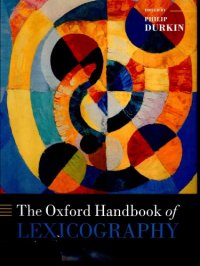
Ebook: The Oxford Handbook of Lexicography
Author: Philip Durkin
- Genre: Linguistics
- Year: 2016
- Publisher: Oxford University Press
- Edition: Hardcover
- Language: English
- pdf
1. Introduction, Philip Durkin
PART I: The Synchronic Dictionary
2. Dictionaries for general users: History and development; current issues, Henri Bejoint
3. Learners' dictionaries: History and development; current issues, Reinhard Heuberger
4. Bilingual dictionaries: History and development; current issues, Thierry Fontenelle
5. Constructing a corpus, Marc Kupietz
6. Interrogating a corpus, Iztok Kosem
7. Definition, Patrick Hanks
8. Explaining meaning in learners' dictionaries, Rosamund Moon
9. Explaining meaning in bilingual dictionaries, Arleta Adamska-Salaciak
PART II: Historical Dictionaries
10. Historical dictionaries: History and development; current issues, John Considine
11. Quotation evidence and definitions, Andrew Hawke
12. Using historical corpora and historical text databases, Laurel J. Brinton
13. Grammatical analysis and grammatical change, Edmund Weiner
14. Etymology, word history, and the grouping and division of material in historical dictionaries, Philip Durkin
PART III: Specialist Dictionaries
15. Place-name dictionaries, Tania Styles
16. Personal and surname dictionaries, Peter McClure
17. Pronouncing dictionaries, Catherine Sangster
18. Spelling dictionaries, Franziska Buchmann
19. Slang dictionaries, Julie Coleman
20. Etymological dictionaries, Eva Buchi
21. Dictionaries of dead languages, Richard Ashdowne
22. Diachronic and synchronic thesauruses, Christian Kay and Marc Alexander
23. Regional and dialect dictionaries, Clive Upton
24. Scientific and technical dictionaries; coverage of scientific and technical terms in general dictionaries, Holger Becker
PART IV: Specific Topics
25. The treatment of multi-word units in lexicography, Christiane Fellbaum
26. Lexicography and theories of lexical semantics, Dirk Geeraerts
27. Meaning relations in dictionaries: Hyponymy, meronymy, synonymy, antonymy, and contrast, Lynne Murphy
28. Identification of homonyms in different types of dictionaries, Anu Koskela
29. The representation of pronunciation in general dictionaries, Graham Pointon
30. Labelling and metalanguage, Charlotte Brewer
31. The exploitation of dictionary data and metadata, James McCracken
32. Illustrations in dictionaries; encyclopaedic and cultural information in dictionaries, Annette Klosa
33. Making decisions about inclusion and exclusion, Graeme Diamond
34. Description and prescription in dictionaries, Lynda Mugglestone
35. The practicalities of dictionary production; planning and managing dictionary projects; training of lexicographers, Valerie Grundy and Diana Rawlinson
36. The demands of users and the publishing world: Printed or online, free or paid for?, Hilary Nesi
37. National dictionaries and cultural identity: Insights from Austrian German and Canadian English, Stefan Dollinger
A chronology of major events in the history of lexicography
PART I: The Synchronic Dictionary
2. Dictionaries for general users: History and development; current issues, Henri Bejoint
3. Learners' dictionaries: History and development; current issues, Reinhard Heuberger
4. Bilingual dictionaries: History and development; current issues, Thierry Fontenelle
5. Constructing a corpus, Marc Kupietz
6. Interrogating a corpus, Iztok Kosem
7. Definition, Patrick Hanks
8. Explaining meaning in learners' dictionaries, Rosamund Moon
9. Explaining meaning in bilingual dictionaries, Arleta Adamska-Salaciak
PART II: Historical Dictionaries
10. Historical dictionaries: History and development; current issues, John Considine
11. Quotation evidence and definitions, Andrew Hawke
12. Using historical corpora and historical text databases, Laurel J. Brinton
13. Grammatical analysis and grammatical change, Edmund Weiner
14. Etymology, word history, and the grouping and division of material in historical dictionaries, Philip Durkin
PART III: Specialist Dictionaries
15. Place-name dictionaries, Tania Styles
16. Personal and surname dictionaries, Peter McClure
17. Pronouncing dictionaries, Catherine Sangster
18. Spelling dictionaries, Franziska Buchmann
19. Slang dictionaries, Julie Coleman
20. Etymological dictionaries, Eva Buchi
21. Dictionaries of dead languages, Richard Ashdowne
22. Diachronic and synchronic thesauruses, Christian Kay and Marc Alexander
23. Regional and dialect dictionaries, Clive Upton
24. Scientific and technical dictionaries; coverage of scientific and technical terms in general dictionaries, Holger Becker
PART IV: Specific Topics
25. The treatment of multi-word units in lexicography, Christiane Fellbaum
26. Lexicography and theories of lexical semantics, Dirk Geeraerts
27. Meaning relations in dictionaries: Hyponymy, meronymy, synonymy, antonymy, and contrast, Lynne Murphy
28. Identification of homonyms in different types of dictionaries, Anu Koskela
29. The representation of pronunciation in general dictionaries, Graham Pointon
30. Labelling and metalanguage, Charlotte Brewer
31. The exploitation of dictionary data and metadata, James McCracken
32. Illustrations in dictionaries; encyclopaedic and cultural information in dictionaries, Annette Klosa
33. Making decisions about inclusion and exclusion, Graeme Diamond
34. Description and prescription in dictionaries, Lynda Mugglestone
35. The practicalities of dictionary production; planning and managing dictionary projects; training of lexicographers, Valerie Grundy and Diana Rawlinson
36. The demands of users and the publishing world: Printed or online, free or paid for?, Hilary Nesi
37. National dictionaries and cultural identity: Insights from Austrian German and Canadian English, Stefan Dollinger
A chronology of major events in the history of lexicography
Download the book The Oxford Handbook of Lexicography for free or read online
Continue reading on any device:

Last viewed books
Related books
{related-news}
Comments (0)